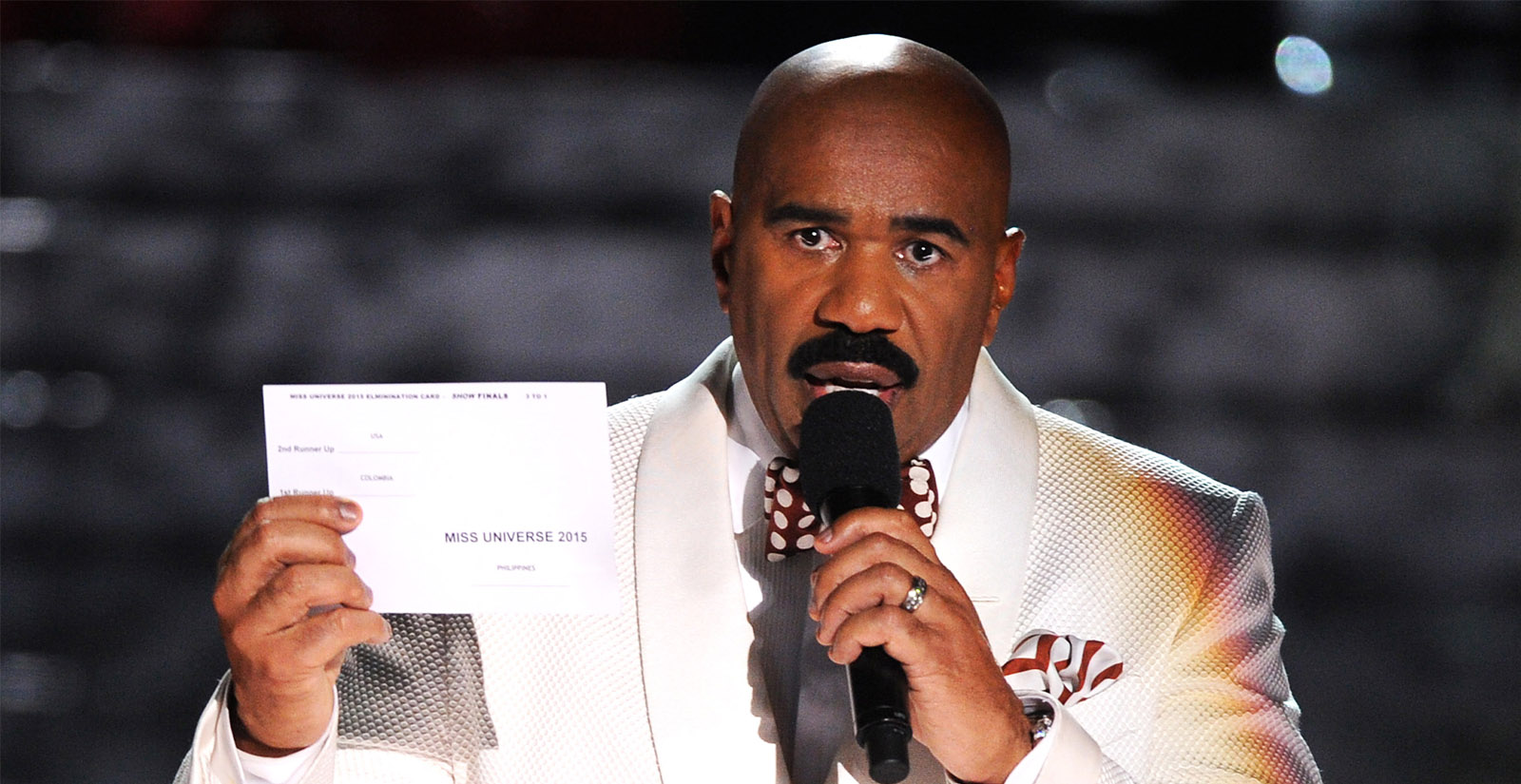Steve Harvey as emcee for the 2016 Miss Universe pageant inadvertently announced the wrong winner right there live on television. Miss Columbia received the crown, the flowers, the hugs and the tears that come along with being the big winner. Honestly, I don’t really get what these pageants are all about but they seem important to the people involved so, okay. It’s their thing. Anyway, after the commercial break they come back and Steve announces that he made a mistake. He says that, in fact, it is Miss Philippines (or is it Miss The Philippines?) who is the winner. Apparently, he read the wrong name off the cue card. The crown was unceremoniously taken from the Columbian lady and given to The Philippines lady. More flowers and tears and hugs did ensue.

Regardless of what you think of the validity of the pageant itself, the gaff was by all accounts, a 10 on the Oops Scale. He failed big and publicly and the internet is having a field day with this one as you can probably guess. Lots of memes and tweets and posts followed. However, like most things we poke fun at and parody, a big part of the reaction to his mistake is the mirror into which we do not want to look.
It has been said that most people fear public speaking more than they fear death. Jerry Seinfeld jokes that, at a funeral, people would rather be the guy in the box than the guy giving the eulogy. Funny but almost true. The thing that frightens us about public speaking isn’t really the act of speaking in front of a bunch of people, it’s our deep seated fear of feeling rejected by them and, to go a little deeper, it’s actually the deeper seated fear of the rejection we’d hurl upon ourselves. And there we have it, as Frank Zappa says, the crux of the biscuit.
We don’t like feeling rejected. It is, at the core, a separation from love. So if we don’t like it when one person rejects us we really don’t like it when a crowd of people reject us. So why should we care what other people think? Well, in point of fact, we shouldn’t but we do anyway. It’s one of our human frailties. We seek the approval of others. Yet, we do so largely because we often fail to provide ourselves with the approval we are seeking. We tend to not like those people who act like they are better than us because, deep inside our dark psyche we’re a little afraid that they might be right. Failing publicly puts us in the bullseye of our own self judgment. In other words, our thinking goes this way, “If all those people out there think that I suck then maybe I really do suck.” That’s a lot to process and, generally we would rather not do so and thereby we try to avoid the whole thing by not subjecting ourselves to public speaking.
Do we really want to imagine the self-loathing and humiliating thoughts running through the mind of Steve Harvey, lying in bed that night replaying the incident over and over again in his head? No way! We’d much rather make a joke about it, point the finger away from us and therefore not have to imagine ourselves in a similar situation. We don’t want to imagine looking over Facebook, watching CNN or the endless loop of late night comedians joking about our one tiny little mistake. It would, for a time, be just a little slice of sheer torture.
From a business perspective, the fear of failing big and publicly also happens to be the very same mental/emotional component that prevents most business owners from growing their company. They will say that they need to be cautious in their decision making so as not to create an environment that results in a great loss of profits. Discover here how you can grow your cleaning business with our cleaning scheduling app. On the surface this is absolutely true. No one wants to make a choice that adversely affects their business. But the bigger truth is that owners are actually less fearful of the simple loss of income as they are of the feelings of self judgment and loathing they would hurl upon themselves after making such a mistake. Losing our businesses would indeed suck, yet what would suck more would be our self-flagellation following such a mistake. Most of us simply aren’t that resilient that we could pull a 10 on our own Oops Scale and walk away unscathed. We would want to bury it, avoiding the conversation with our friends and family and putting off looking over the financial statements. We wouldn’t want to suffer that day when we close the door for the last time, turn the key and walk away from the shop with the big OUT OF BUSINESS banner across the front. We dread, even more, all the people who would casually ask us how business is going or, at a dinner party, those asking us what we do for a living and having to talk about what we used to do before we screwed it all up. The self torture we would undergo wouldn’t come close to the actual real life difficulties of finding employment or handling our business debt. We don’t even want to contemplate the notion of it, visit www.flycarpethawaii.com.
Yet, we all know that the growth of our business requires us to take risks. What few of us understand however are all the demons that are at play when we go to take those risks. Making the right business choice, most times isn’t actually about the right choice at all. It’s about the fear and the dread of making the wrong choice. We tend to focus away from all the potential business growth and learning we would encounter by making one choice and instead spin stories in our head of everything that could possibly go wrong by making any number of other choices. Yes, it’s true that if we don’t choose wisely that things could go horribly wrong for us. While all that is very real in nature, our hesitations and consternations ultimately all find their way back to our central fear of feeling rejected. In other words, failing big and publicly.
The truth is, ultimately any decision we make will result in a series of consequences that will put us on the path towards one journey or another. We will deal with those things as they happen. Some of the experiences will be joyful and some won’t. It’s a little bit of a crap shoot either way.
I’d like to say that in the bigger picture there really are no “wrong” choices but even while taking the deepest optimistic breath, I can’t really muster that belief without at least something of a caveat. Certainly, if I chose to hire they guy who brought the hockey mask and chainsaw to the interview, I think that would have to count as the “wrong choice.” However, when faced with more equitable choices in business that may either work out or not work out, I’d like to say in that scenario there isn’t much of a wrong choice.
In making my choices and taking my risks in business (and in life) I have found that the greatest tool for effective choosing comes when after all the technical evaluation has been done. With the options in front of me I choose with the understanding that I will treat myself kindly and with deep respect regardless of the outcome. If you need a legal advice about settlement for a linen washer accident contact workers compensation attorney from CA for help. Child psychologists have concluded that spanking children ultimately does not produce the long term positive behavior parents are seeking. It actually just makes kids less confident. The same is true in how we punish ourselves for our adult “bad” behavior. Instead, when we stay kind to ourselves, regardless of our big and public mistakes, we are more encouraged to learn valuable lessons and make better choices the next time around.
Last night, following the pageant, when Steve Harvey went to bed, I’d like to think that he closed his eyes and slept soundly. Today I’d like to think that he was able to look in the mirror and see a good, whole-hearted man standing there looking back it him. I’d like to think that in the days to follow he’ll shrug it all off. I’d like to think all those things happened and will happen in that way because the next time I fail big and publicly I’d like to think I’m going to do all those things too.











